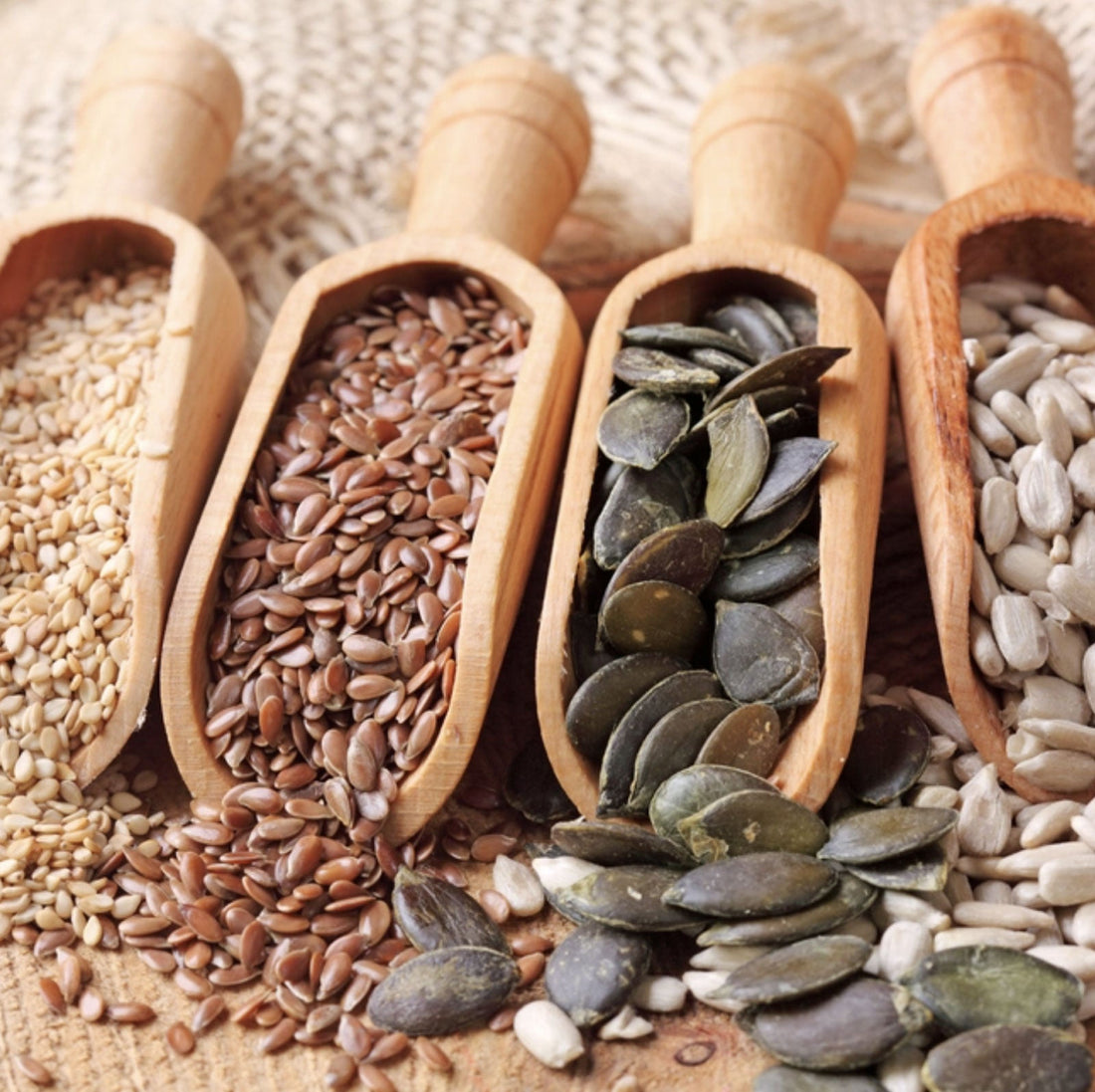There are several things we can do to help keep our hormones happy and balanced, and one of the best ways is through our diet. If you’re looking specifically to keep estrogen and progesterone levels in check, you may have heard of the phenomenon called seed cycling. But what exactly is it?
Seed cycling is the idea that certain types of seeds can help regulate the levels of estrogen, progesterone, and other hormones. This is achieved by synchronizing your consumption of various seeds with your menstrual cycle.
What seeds are involved in seed cycling?
The seeds you’ll need to get started are pumpkin, flax, sesame, and sunflower. Pumpkin and flax are consumed together and then the same with sesame and sunflower. While the menstrual cycle is technically four phases, we’ll be focusing specifically on the follicular and luteal for this process. Phase one correlates with follicular and phase two with luteal.
Phase one: Days 1-14* you’ll be consuming flax and pumpkin seeds. The dominant hormone in this phase is estrogen; the lignans found in these seeds act as phytoestrogens and help modulate your body’s estrogen production.- Flax seeds. These guys are packed with omega-3s, magnesium, zinc, and fiber, which help promote a healthy gut microbiome.
- Pumpkin seeds. Containing magnesium, zinc, iron, tryptophan, and antioxidants such as carotenoids and vitamin E, they support hormone health and regulation.
- Pumpkin seeds have also been shown to be beneficial to those suffering from overactive bladder conditions.
- Zinc is a necessary mineral for Luteinizing Hormone release and ovulation, which makes this combination perfect for phase one.
- Consume one tablespoon of each daily, preferably ground, to aid in nutrient absorption. Note: Flax seeds must be ground in order to gain the benefits.
*Day 1 of your cycle refers to the first day of your period.
Phase two: On days 15-28 you’ll consume sesame and sunflower seeds. The dominant hormone in this phase is progesterone and consumption of these seeds in this phase has been shown to be clinically relevant in supporting healthy levels of progesterone.
- Sunflower seeds. Rich in vitamin E and selenium, they help ovulation, progesterone production, and with the detoxification of hormones.
- Sesame seeds. A study revealed that consuming 50g of sesame seed powder for five weeks resulted in an elevation of serum sex hormone-bind globulin (SHBG).
- Consume one tablespoon of each daily, preferably ground, to aid in nutrient absorption.
Seeds are naturally high in omega fatty acids which have health benefits ranging from fetal development, healthy cholesterol, and reduced inflammation. They also help with adequate fiber intake. Some evidence shows that flax seeds can improve fasting blood sugar, HbA1C, as well as show beneficial results in decreasing a woman’s risk of breast cancer.
What does seed cycling provide support for?
There are several conditions that seed cycling is used to help combat. Most stem from hormonal imbalance, which is why seed cycling is utilized, as it is said to help bring hormones back into balance.
- PMS. Premenstrual syndrome affects as many as three-quarters of people with periods, according to doctors. The lignans found in flax seeds are said to help balance hormones throughout your cycle which could decrease your PMS symptoms.
- Menopause. Menopause is inevitable for every menstruator, but that doesn’t mean there isn’t anything you can do to ease your symptoms. The declining levels of estrogen can be counterbalanced by the lignans in sesame seeds.
- Quitting the pill. Most of us aren’t prepared for what happens when we decide to come off hormonal birth control, but seed cycling may help ease the transition. Since the pill suppresses hormone production, seed cycling can help get your progesterone levels back on track with zinc-rich pumpkin seeds, which help as you transition from your estrogen-dominant phase to your progesterone dominant one.
- Perimenopause. The time in which estrogen and progesterone are fluctuating as you approach menopause is called perimenopause and can be supported through seed cycling to help ease your symptoms.
- Post-menopause. After you’ve officially been period free for a year and hit the menopause milestone, you enter post-menopause, where you’ll be for the rest of your life. Sesame seeds have been shown to improve blood lipids, antioxidant status, and sex hormones in post-menopausal women.
- PCOS. Polycystic Ovarian Syndrome affects 10% of menstruating people in their reproductive years. Blood sugar imbalances are often found at the center of symptoms and seed cycling can help support missing periods and balance out blood sugar levels.
- Acne. Pumpkin seeds contain skin-glowing essentials like vitamin E, zinc, and omega-3 fatty acids. Try putting a hold on spending your hard-earned cash on topical solutions and focus on what you’re putting into your body and see if that makes more of a difference.
- PMDD. Premenstrual Dysphoric Disorder afflicts roughly 5% of menstruators and is a more severe condition than PMS. Omega-3 fatty acids have mood-balancing effects and can help right hormone levels for PMDD sufferers.
- Preconception. If you’re trying to get pregnant, ensuring your hormone levels are optimal beforehand can help increase your chances.
Is seed cycling right for you?
Overall, the goal of seed cycling is meant to help your hormones stay balanced. Hormones play a critical role in many bodily functions such as your blood sugar levels, weight, appetite, mood, gut health, sleep-wake cycle, physical appearance, and more. It doesn’t take much to get started either, your local grocery store should have everything you need. It can be a great tool to add to your toolbox on top of things like The Balanced Cycle Bundle, giving your hormones double the love by combining the practice with the Semaine supplements that are already part of your routine.
Ultimately, the decision to start the practice of seed cycling is up to you, but it can be a fantastic natural approach to balancing hormones with the added benefit of increasing overall wellness through the vitamins and minerals the seeds provide. Additionally, it can be utilized throughout a menstruator’s entire life! Chat with your doctor before you start and make sure you don’t have any nut or seed allergies.


